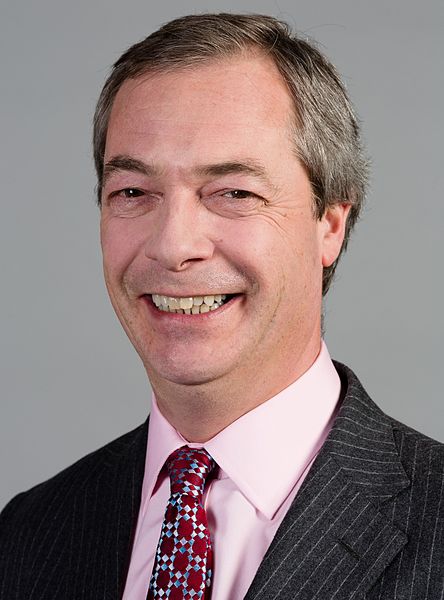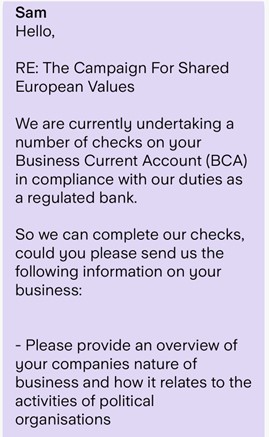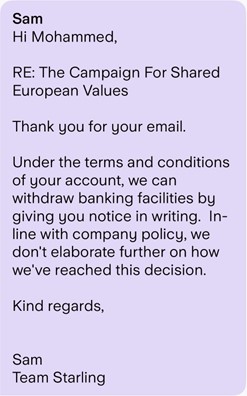
Its not just Nigel Farage who gets debanked
Buried within the story of whether Nigel Farage is rich enough to justify a bank account with Coutts is an issue of huge importance for democracy in Britain.
No – it’s not whether companies should be allowed to refuse to take people on as clients because of their views. It is the how the rules surrounding Politically Exposed Persons (“PEPs”) are applied.
Obviously, Mr Farage hasn’t mentioned this. Perhaps because it affects thousands of other people which eliminates his narrative that he is special, a martyr. But speak to anyone in politics and they can to point you towards someone who has been refused a bank account or had a bank account closed.
In May, at the Campaign for Shared European Values, we received the following message from our bank, Starling.

We replied in great detail, including sending Starling Bank a copy of our accounts, to explain exactly what we do and how we are funded. We concluded by summarising our objectives: “We would summarise our objectives as promoting, within the UK, understanding of our shared European heritage, values, human rights and the rule of law.”
Hardly incendiary, man-the-barricades, French Revolution sort of stuff. After some delay, the next thing we got back from Starling Bank was the message below:

That was it. No reason given, and making it clear that they would not give us a reason. (We even tried asking for one!) We had been “debanked” as it is now called.
This practice clearly goes from the top to the bottom:
- from Coutts to Starling
- from the rich and famous to new groups fighting to support European values.
We began by claiming that this was important for democracy in Britain. That might seem slightly hyperbolic. But think about this.
At the last election, one of our directors was the election agent for a candidate from a major UK party. In line with his responsibilities under election law, he applied to open a campaign account to bank donations and to pay election expenses.
The bank he approached refused turned him away with the message “We cannot open a bank account for anyone involved in politics.”
There is a real risk that before the next general election (less than 18 months away), thousands of candidates and their election agents may end up in the same position. How will they be able to run their campaign finances?
The PEP rules were brought in because London had become a favourite place for corrupt foreign politicians to launder the money they had collected in bribes and stolen from their national treasuries. “No names, no pack drill!” But you may recognise the nickname “Londongrad.”
We don’t believe the rules have made much difference to corrupt foreign politicians. When you have billions, you can find lawyers, accountants and bankers who want to help you.
What the rules have done is encourage banks to “virtue signal.” They can show how seriously they take money laundering by being really tough with the “little people” such as MPs, their election agents, and people like us.
The government introduced the PEP rules, and it needs to fix them so that they stop hurting British democracy.
That is the real story. Not whether their Brexit buddy Nigel Farage needs to be kept happy.
The photo of Nigel Farage in 2014 is by David Iliff. License: CC BY-SA 3.0
